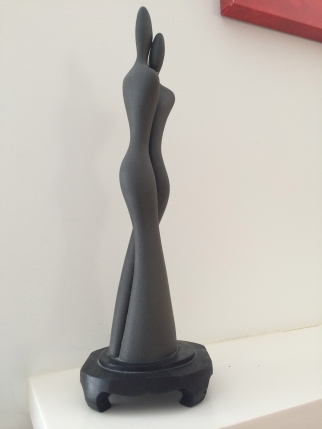[By the time you read this, I shall have spent the afternoon just past in Manhattan, attending a cello concert in his other grandmother’s apartment by my now-eight-year-old grandson. (She has a piano for the accompanist; that’s why it takes place there.) Those of you who’ve been hanging around TGOB for a while, say ten months or so, may recall I did the same thing last year, when he was seven. The concert last year was to commemorate his having finished the pieces in Book One of the Suzuki Method and being able to play them all by heart. Now he has mastered the pieces in Book Two. Given the amount of money his loving parents have poured into this lengthy learning process, I anticipate at least better finger skills and perhaps more interesting “music.” Anyway, what are grandmas for, if not to fill seats at Sunday afternoon musicales by their progeny?
Not being one who is able to tap out posts on an i-Phone while riding New Jersey Transit into Penn Station, I thought it might therefore not be inappropriate to keep the blog going tonight by re-running the piece that appeared here last March after his first concert, which was not really about the concert at all. Nothing much has changed. Same crappy weather; same black down coat; same handbag and water bottle; same glasses on a chain. (Different book and different scarf, but those are mere details.) Most important: the same feelings. Now if only the rest of the ride home were unchanged! Well, we can’t have everything, can we?]
******
LUST
Last Sunday, I went in to New York by train to attend a cello concert given by my seven-year old grandson for his parents, grandparents and a few young friends from school who are also studying an instrument. He had finished Book One of the Suzuki method of instruction, and part of the Suzuki method is the requirement that the student play all of the pieces in the book from memory for an informal gathering of family or friends.The concert was a happy event, carried off with aplomb by its sole performer (who loves applause) — with plenty of tasty refreshments afterwards.
The trip in and out of the city, however, was a less happy event, as it always is, something realtors invariably neglect to mention when you are looking to buy in Princeton. Except for the politicos among us, Princetonians generally try to forget that Princeton is in New Jersey. When someone asked me over the post-concert refreshments if I was from New Jersey, I instinctively answered, “Well, yes, but not really. I live in Princeton.” To which he replied, “Ah yes. That is a separate place.”
The train to New York City from Princeton is the New Jersey Transit Northeast Line. It should come as no surprise to anyone who rides it to hear me call it a third-world train. It is slow, with antiquated cars, and passes through some of the most run-down parts of a state generally acknowledged to be blighted (despite the proud claims of its portly and vindictive governor). When it finally arrives, it pulls into the belly of hideously overcrowded Penn Station, itself located beneath Madison Square Garden in an unpleasant, highly commercial part of the city packed with human bodies pushing every which way against you as you try to fight your way out of the exits.
That said, the Northeast Line does boast a few — very few — newer cars, designed to carry more passengers per car length by being double decker (with one station-level section at each end of each car), and colored blue (in contrast to the dingy turd-brown color of the older cars). So it was my good fortune that the 4:34 to Trenton last Sunday afternoon (passing Secaucus, Newark Airport, Newark Penn Station, Metropark, Linden, Edison, New Brunswick and Princeton Junction on its way) was one of the so-called “new” ones. And it wasn’t even crowded.
In fact, by the time I had phoned Bill to alert him to when I’d be home, reviewed the photos and two videos of the concert on my i-Phone, taken a swig of water from the water bottle I carry in my purse on trips, nodded off for three or four stops, and then pulled myself back into consciousness to check where we were on the itinerary, I found I was due to get off at the next stop and there were just two other people left in the lower level of the car I was sitting in. One of them was across the aisle from me and in the row ahead, so I had only a partial view of his profile from the rear, but something about it attracted my attention.
Was it the line of his jaw? The muscle outlining the side of his mouth? The slightly olive complexion? The contrast between his bookish eyeglasses and the knit cap with a hole in the back that nearly covered his dark brown hair? Except for the knit cap, he strongly resembled — in one-third rear profile — my first serious boyfriend as he had been in 1948 and 1949. But he looked taller. And the hands were larger — more like my first husband’s, only with less pronounced knuckles. They were deftly manipulating photos on a smartphone over which he leaned — with what? Interest? Longing?
The leaning posture showed me the shape of his muscular shoulders, tapered back and narrow waist beneath a short jacket of some thinsulate material that clung. Safe from his view, I further examined with growing interest the lean strong thighs pressing against his narrow jeans. I even noted his footwear: tan laced-up ankle boots collared in dark brown leather. He was what? Twenty-eight? Thirty at most?
You could say I gobbled him up with my eyes. Then I was stripping him naked in my mind and sliding my hands against his skin. Yes, I was aware of who I was and what I looked like (had anyone been looking, but no one was): an eighty-two year old grandma in a black down full length coat, with a wavy grey wool scarf around her neck and glasses hanging on a chain over them, with a book by Louis Begley and a water bottle sticking out of her dark red leather handbag. But I was nevertheless flooded with what had rapidly transformed itself into unabashed and ravenous lust — for a man easily young enough to be my grandson (had I begun reproducing somewhat earlier than I did) and with whom I almost certainly had absolutely nothing in common. And yet, in some other fantasy world where he was blind (and therefore willing) — I might have dropped to my knees between his legs and reached for the zipper, right there on the New Jersey Transit between New Brunswick and Princeton Junction. Not that I’ve ever actually done anything like that in my real life. But the older you get, the freer the thoughts.
Just then he leaped to his feet, snatched up his khaki backpack and moved fast to the stairs leading up to the station-level part of the car. This section had a few fold-up seats lining the sides, where passengers are supposed to park their heavy baggage, strollers, carriages and bikes. Without a second thought as to what I was doing, I too stood and followed him down the aisle and up the stairs, where I sat down again on one side. Against the other, he was re-assembling a large green racing bicycle, his back to me. When he was done, he turned to hold the bike steady just as the train pulled in to Princeton Junction, and then rolled it out towards the door. Full face, he looked somewhat different than I would have thought, but not unattractive. The eyes were dark, the nose was strong, the mouth….(Believe it or not, I’ve run out of affirmative adjectives.) As he passed me, the only other passenger in that part of the car, our eyes met. Just for a moment he saw me. But he didn’t see me. What he saw was of no interest to him, and I hadn’t thought it would be, nor would I have wanted it to be. (Whatever I am, I’m no fool.) I had no time to be embarrassed. He looked away, was out of the car, on his bike and into the cold drizzle, pedaling towards his real life, whatever it was, before I stepped onto the platform.
Young people don’t know this stuff about old people. They feel it all belongs to them, because their bodies are gorgeous (even if they think they aren’t), and their skin is taut, and they move so easily, so quickly, so gracefully. But it doesn’t belong just to them, and they’ll find out, if they live long enough. Some older women may claim I’m wrong, and good riddance, but that’s sour grapes, I think. (What do you suppose hormone replacement therapy is for?) And I bet there isn’t an older man alive who believes desire is only for the young.
I could have just written about the cello concert and kept all the rest of it to myself, but the cello concert was only one part of my Sunday. And if I had to choose between the two parts, I ‘m not sure which I’d pick. It doesn’t matter that the object of my desire will never know, or want to reciprocate. It may be sad that I’m old, but it’s great that I feel.
I’m still alive! And who wouldn’t choose that?



















